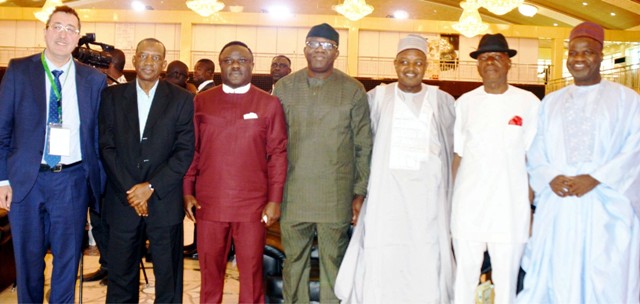Business
Minimum Wage: NLC Decries Delay In Committee Sitting

The Nigeria Labour Congress (NLC) has decried the delay in the sitting by the Tripartite Committee for the negotiation of the National Minimum Wage for workers in the country, since its inauguration.
Acting President of NLC, Mr Kiri Mohammed, said this yesterday in Abuja at the 11th Quadrennial Conference of the Nigeria Civil Service Union, Federal Council, with the theme: “Equipping the Union to Face the Challenges of 21stCentury.”
According to him, the organised labour will no longer tolerate the delay in implementation of the National Minimum Wage for workers.
“Since we had an inaugural meeting, they have not called for a meeting; it looks like there is a deliberate delay for the negotiation process.
“We have not even started the negotiation process but if we meet we would modify our demand for the upward review,” he said.
He disclosed that the organised Labour has demanded for the upward review of N56,000 minimum wage for workers in the country.
Recall that the NLC and the Trade Union Congress of Nigeria (TUC) have jointly proposed and presented N56,000 as the new minimum wage to the Federal Government as against the present N18,000.
He said the reason for the upward review was imperative as the present economy realities have surpassed that of two years ago.
According to Mohammed, organised labour due to economy reasons then obviously demanded N56,000 as minimum wage two years ago, from Mr President and to date nothing has happened.
“ For that same reasons, NLC decided to look at those reasons and see how it can be modified and we have actually decided for upward review of more than the N56,000 as minimum wage for workers.
“So, the leadership of the organised labour met and decided to look at the present economy realities on the ground and our finding is that the N56, 000 is not enough.
“That is why we have made a fresh submission and we have submitted it to the secretariat of the Tripartite Committee of the National Minimum Wage.
“But, I am not going to tell you the actual amount because the NLC president is supposed to announce that by himself,‘’ he said.
He assured workers that the NLC would do everything possible to ensure that a living minimum wage was implemented for workers in the country.
He, however, commended members for their support during the recently concluded national delegated conference of the Nigeria Civil Service Union (NCSU).
Earlier in his address of welcome, Mr Odebunmi Timothy, Acting Chairman of the (NCSU) Federal Council noted the minimum wage for workers was long overdue.
Business
FIRS Clarifies New Tax Laws, Debunks Levy Misconceptions

Business
CBN Revises Cash Withdrawal Rules January 2026, Ends Special Authorisation

The Central Bank of Nigeria (CBN) has revised its cash withdrawal rules, discontinuing the special authorisation previously permitting individuals to withdraw N5 million and corporates N10 million once monthly, with effect from January 2026.
In a circular released Tuesday, December 2, 2025, and signed by the Director, Financial Policy & Regulation Department, FIRS, Dr. Rita I. Sike, the apex bank explained that previous cash policies had been introduced over the years in response to evolving circumstances.
However, with time, the need has arisen to streamline these provisions to reflect present-day realities.
“These policies, issued over the years in response to evolving circumstances in cash management, sought to reduce cash usage and encourage accelerated adoption of other payment options, particularly electronic payment channels.
“Effective January 1, 2026, individuals will be allowed to withdraw up to N500,000 weekly across all channels, while corporate entities will be limited to N5 million”, it said.
According to the statement, withdrawals above these thresholds would attract excess withdrawal fees of three percent for individuals and five percent for corporates, with the charges shared between the CBN and the financial institutions.
Deposit Money Banks are required to submit monthly reports on cash withdrawals above the specified limits, as well as on cash deposits, to the relevant supervisory departments.
They must also create separate accounts to warehouse processing charges collected on excess withdrawals.
Exemptions and superseding provisions
Revenue-generating accounts of federal, state, and local governments, along with accounts of microfinance banks and primary mortgage banks with commercial and non-interest banks, are exempted from the new withdrawal limits and excess withdrawal fees.
However, exemptions previously granted to embassies, diplomatic missions, and aid-donor agencies have been withdrawn.
The CBN clarified that the circular is without prejudice to the provisions of certain earlier directives but supersedes others, as detailed in its appendices.
Business
Shippers Council Vows Commitment To Security At Nigerian Ports
-
Business2 days ago
Shippers Council Vows Commitment To Security At Nigerian Ports
-

 Business2 days ago
Business2 days agoCBN Revises Cash Withdrawal Rules January 2026, Ends Special Authorisation
-

 Business2 days ago
Business2 days agoNigeria Risks Talents Exodus In Oil And Gas Sector – PENGASSAN
-
Business2 days ago
NCDMB, Others Task Youths On Skills Acquisition, Peace
-

 Business2 days ago
Business2 days agoFIRS Clarifies New Tax Laws, Debunks Levy Misconceptions
-

 Politics2 days ago
Politics2 days agoTinubu Increases Ambassador-nominees to 65, Seeks Senate’s Confirmation
-
Sports2 days ago
Obagi Emerges OML 58 Football Cup Champions
-

 News2 days ago
News2 days agoTinubu Swears In Christopher Musa As Defence Minister

